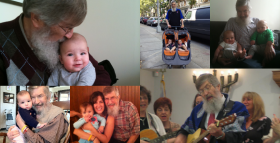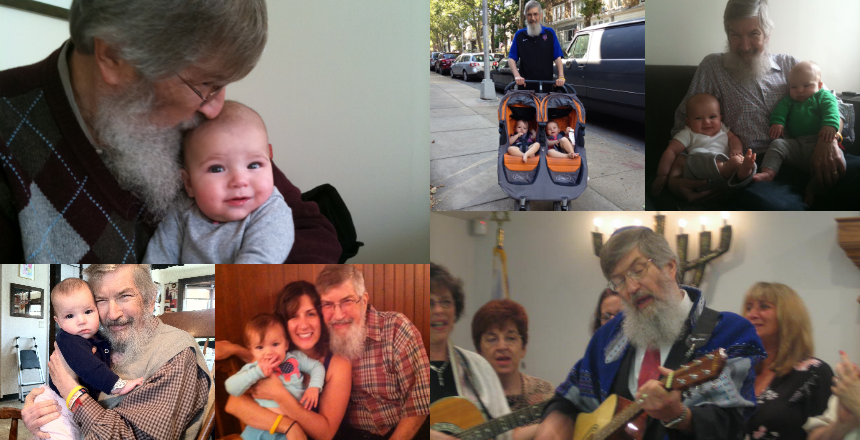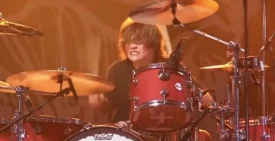My kids — twin girls, two-and-a-half — talk about their Papa. A lot.
But my father died some 14 months ago, when they were just 18 months old. And while looking at photos of them together reassures me that my father knew my kids and my kids knew him, there is very little chance my girls retain any original memories of their grandfather. Rather, they talk about my dad because I do.
Whether I think they’re listening or not, I talk to the girls about how much their Papa loved cowboy music and then I find a cowboy music station on Pandora and I play it in the car. I talk about how much Papa loved baseball and we go to Mets games and they wear their baseball caps and they parrot back “Papa loved baseball.” I remind them that Papa had a long gray beard and now everyone with a beard is referred to as “Papa.” I use the Yiddish words he used when I refer to their heads and their hands and their faces. I hold doors open for people in stores and I tell them that Papa did the same.
We also look at pictures. I remind them of the time Papa pushed them in their stroller down our old block in Brooklyn and about the time Papa held them on his lap and tickled their bellies. I remind them that one summer we all went up to the mountains and Papa sat on the porch in a rocking chair and they crawled around near his feet and this made him very happy. And I tell them that sometimes when they see me cry (and yes, they see me cry) it is because I miss Papa. They don’t know what “miss” means but they know to stop and be quiet for a minute before they go back to being two and a half.
If it is actually possible to recreate for your children an understanding of a person they’ll never really know, I imagine this is the way to do it.
But there are times when I want to stop, and just be quiet. And there are times when I can tell they’re confused (or maybe they’re always confused and I only occasionally acknowledge it). Just the other day, when I entered their room in the morning, one of my girls told me that Papa was in her crib. I tried to explain that no, Papa’s not in her crib, just in her heart, and in her mind, but she had already moved on to talk of waffles for breakfast.
I’m scared that if I stop talking, for a few days, or a few weeks, or longer, then the window of opportunity will slowly close, and any chance I have to imprint my father on the girls’ consciousness will evaporate. I worry he will become, to them, another grandparent lost to the annals of grandparents who die before their time, before their grandchildren get to know them; we all know grandparents like this. I had one.
My rational side tells me that regardless of how much I talk, my girls won’t ever really know my dad. Because they won’t know ever know what his eyes looked like when he laughed or the joy of receiving a package from him at summer camp or the comfort of calling him after school to download their day.
But still, I talk. For one thing, I have found that I much prefer talking to my girls about my dad than I do talking about him with anyone else. When I talk to them, I do so unselfconsciously. Gone are the poses and affects I knowingly or unknowingly apply when I feel I’m being looked at too closely. If a friend or family member asks how I’m doing, I have not yet discovered a way to answer truthfully, substantively, so I deflect. And then there’s no comfort in those conversations. I cannot begin to unpack my grief while standing on one foot, and so I’d rather not unpack at all.
But when I talk to my kids, there is none of that posturing. They are listening, no ulterior motives. And when I find myself spooning out the mac and cheese on a random Tuesday night and one child says, apropos of nothing, “Papa used to call me Avi Wasabi!” I know in that moment, that my words matter. The girls are retaining bits and pieces of my father’s life story, and this knowledge eases some of the pain.
And so, I talk some more.
Adina Kay-Gross is a contributing editor at Kveller.com and teaches writing in Manhattan. She is currently co-editing an anthology about the modern Jewish mother.









